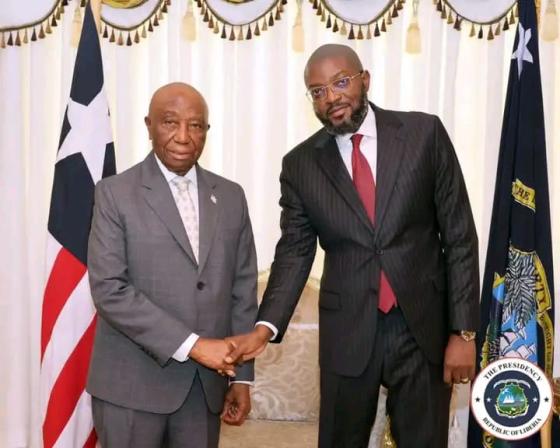Liberia: Boakai Mandates GAC to Audit Ministry of State

President Joseph Nyuma Boakai, and GAC boss P. Garswa Jackson
— But Backtracks on NSA’s Audit
President Joseph Boakai has directed the General Auditing Commission (GAC) to carry out a thorough audit of the Ministry of State for Presidential Affairs as part of the administration’s anti-corruption and transparency efforts.
During a meeting on March 20, 2024, at the Executive Mansion, officials from the GAC and the Ministry of State for Presidential Affairs discussed the upcoming audit.
Deputy Minister Cornelia Kruah Togba highlighted that the goal of the audit is to enhance efficiency and effectiveness within the ministry. The audit could be welcoming news for many Liberians who believe that the seat of power has been used over the years to siphon state resources at the detriment of the suffering masses.
Millions of dollars were allotted for over ten years in the national budget for the renovation of the Executive Mansion, which was gutted by fire in 2006. But despite these allotments, which began from the Ellen Johnson Sirleaf administration through the George Weah administration, the seat of the presidency is yet to be completed. Renovation work is still ongoing — a situation that questions how the millions of dollars have been used over the years.
Also recently, officials of government raised concerns over alleged payroll padding at the Executive Mansion, the seat of the presidency that is overseen by the Ministry of State for Presidential Affairs (MOS), causing significant financial strain on the cash-strapped government. The list reportedly constitutes cronies of former President George Weah and members of his Coalition for Democratic Change (CDC).
Deputy Minister Kruah Togba, revealed that the government has discovered over 730 unrecognized employees on a supplementary payroll at the ministry.
Many believe the commissioned audit will shed light on how resources allotted to the presidency have been spent over the years.
Auditor General, P. Garswa Jackson, Sr., confirmed the start of the audit with a System Audit due to the long absence of audits in the Ministry of State for Presidential Affairs. The audit will focus on budgeting, cash handling, procurement procedures, and other pertinent areas.
Jackson expressed anticipation for continuous audits in the ministry. The GAC plans to provide engagement communication by March 27, detailing the audit’s period, scope, and start date. The GAC expects to present its findings within a month.
Boakai Halts NSA Audits
In what seems to be a move to shield the National Security Agency (NSA) from ensuring accountability and financial probity, President Boakai has backtracked on an earlier pronouncement calling for a public audit of the spy agency.
The President called on the GAC to halt audits that the commission was conducting at the NSA — a move that many perceived as a setback to governance transparency in Liberia.
This decision comes just a month after directing the General Auditing Commission to conduct a review of the agency’s financial accounts and expenditures. The decision to halt the audit of the NSA, which has been seen as a focal point of questionable government spending for decades, raises concerns about governmental transparency in a nation where a significant portion of the population is grappling with poverty and hunger — all enhancing perennial massive corruption.
Despite initially aiming to combat corruption by ordering a comprehensive audit of the NSA shortly after taking office, President Boakai's administration decided to halt the auditing process based on security concerns related to the agency’s operations. This decision, as communicated by the Auditor General to members of the legislature, has sparked criticism and raised doubts about the government’s commitment to addressing corruption at various levels.
Former activist Patrick M’bayo, among others, has expressed apprehension over the implications of discontinuing the audit, suggesting that it could perpetuate a culture of corruption within government institutions.
The tone of his message underscores the importance of maintaining transparency and accountability mechanisms to curb fraudulent transactions and prevent the misuse of power, ultimately preserving public trust in governance institutions.
